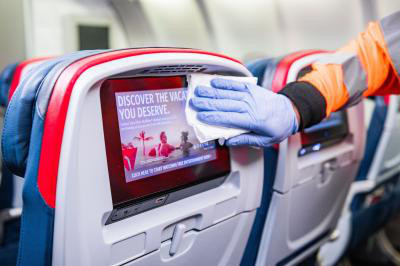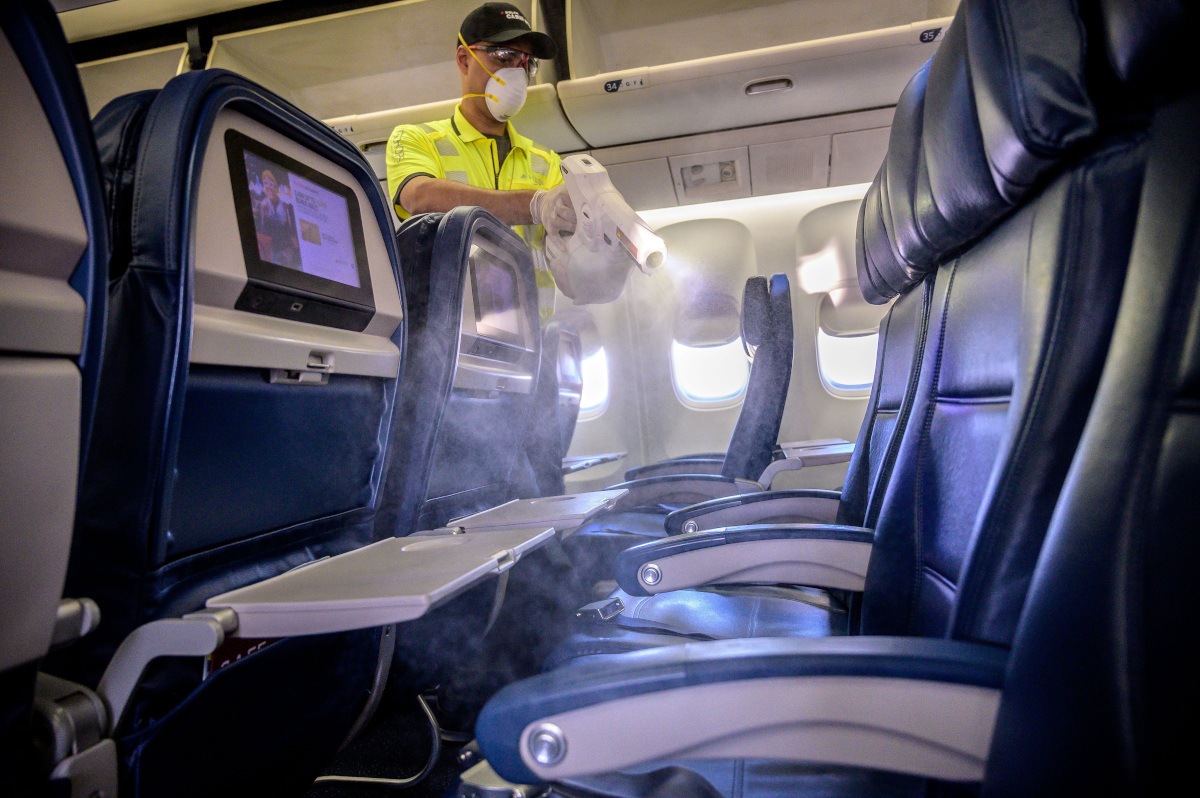Harvard study: Enhanced cleaning onboard airplanes helps reduce infection risk

Disinfecting aircraft cabins is a key part of a multi-layered public health risk-reduction strategy, according to a technical bulletin published this week by faculty at Harvard’s T.H. Chan School of Public Health. The findings support Delta’s extensive cleaning practices, including our industry-leading commitment to electrostatic spraying of high-touch surfaces using high-grade disinfectant on every flight, every day.
“Current research in infection control recommends enhanced cleaning be combined with other risk reduction strategies by airports, airlines, passengers, and aircraft crew members to minimize the amount of infectious virus in the environment,” according to the Harvard report. “These include screening and health attestations to help exclude symptomatic people, use of advanced ventilation and filtration systems on aircraft, and personal protections such as wearing face masks and good hand hygiene.”
Harvard’s latest bulletin – part of a set of recommendations to reduce the health risks of flying during the pandemic – notes that airlines should focus cabin cleaning on high-frequency touch surfaces, with systematic disinfection of surfaces between flights on a daily basis. Every interior surface on every Delta flight is thoroughly sanitized prior to boarding using electrostatic sprayers – including lavatories. Delta is distributing customer care kits, available at all Delta ticket counters and gates, that offer a hand sanitizer wipe and a mask. Customers also receive a hand sanitizer wipe upon boarding. Finally, Delta will become the first U.S. airline where customers can find hand sanitizer stations near the boarding door and bathrooms on every Delta aircraft; those installations began in August.
“We don’t know of any other airline leveraging electrostatic spraying on every flight the way Delta is, and based on the products available in the market today, we’re confident it’s the best way to ensure every surface is disinfected,” said Delta’s Chief Customer Experience Officer Bill Lentsch. “Our Global Cleanliness division is pushing innovation and driving a standard of cleanliness that is best in class, and research like this shows that we’re focusing on all the right measures.”
The Harvard bulletin also notes that aircraft lavatories are high-frequency touch areas subject to special maintenance and cleaning between flights. Delta flight attendants are wiping down high-touch surfaces in lavatories frequently during each flight: While in the air, flight attendants regularly make sure lavatories are clean, tidy, fully stocked with supplies and ready for customers. Using kits that include disinfectant spray, wipes and gloves, flight attendants ensure the thorough sanitization completed prior to boarding stays fresh.
Overall, Delta has instituted more than 100 layers of protection from check-in to baggage claim to deliver a new standard of cleanliness, more space and safer service for customers and employees alike.
These and other layers of protection are in place to ensure customers can fly with confidence aboard any Delta flight:
- Delta customers and our customer-facing employees are required to wear masks, which a previous Harvard bulletin suggested may reduce infection risk from respiratory particles to less than 1 percent in settings such as those on aircraft.
- The air on all aircraft is completely recirculated 10 to 30 times per hour with fresh, outside air and air through industrial-grade HEPA filters, which extract more than 99.99% of particles, including viruses.
- Through at least Jan. 6, 2021, we will ensure more space for customers on all aircraft by blocking the selection of middle seats and limiting the number of customers per flight.
A summary of more of the layers of protection we are providing to keep you safe can be found here.

